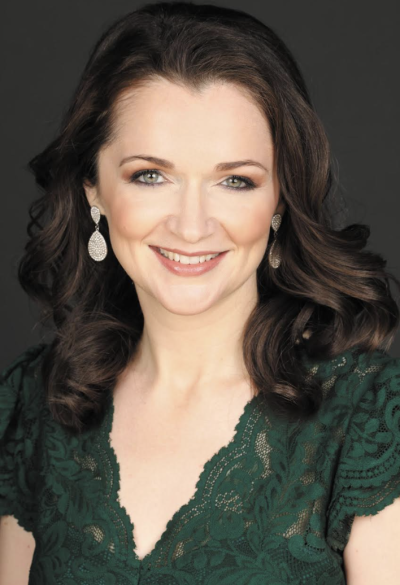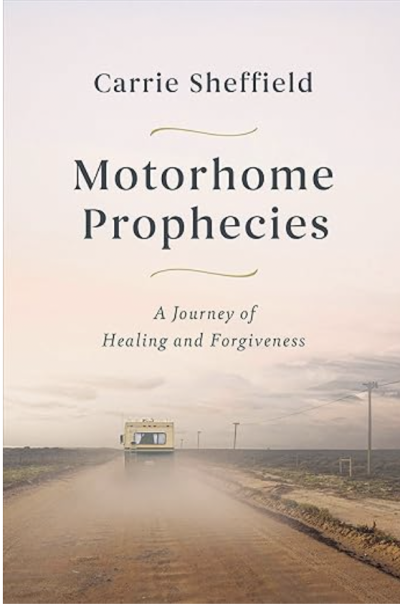Author shares journey of escaping cult leader's grip, finding healing and forgiveness through faith

Growing up, Carrie Sheffield witnessed firsthand how religion can be used to justify evil.
Her father, a Mormon cult leader, believed he was a prophet destined to become president. Eventually excommunicated from the LDS church, he continuously moved his wife and eight children around the country to avoid both religious and state authorities.
Sheffield’s early life was spent on the move, living in various motorhomes, sheds and tents with her large family, attending 17 public schools and being homeschooled at times.
It was, according to Sheffield, a childhood marked by extreme instability, abuse and spiritual manipulation.
“There was constant abuse by my father, telling us we're not worthy, telling us that we're evil, telling us also that he's a prophet and he's basically bringing salvation to America and saving our country from destruction,” she told The Christian Post.
“We were on welfare. At one point, we actually had no food and were boiling water with grass from the city park and eating this grass broth. It was all done in the name of God, is what my father said. Eventually, two of my older brothers developed schizophrenia. When I was 17, the older of those two tried to rape me, he groped me, and it was just incredibly scary and psychologically damaging to me. And at that point, I knew I had to make a decision.”
After making the difficult decision to walk away from her past, Sheffield embarked on an exploration of personal growth. She threw off all notions of religion — “the heart position for me was hostile; I didn’t know if there was a God, but if there was, He probably hated me and I felt the same way,” she said — and threw herself into work and schooling. She earned a full tuition scholarship to Harvard University for a master's degree in public policy and worked as an analyst for major Wall Street firms.
“I was making a ton of money compared to the nothing I had living in a motorhome,” she said.
Eventually, Sheffield launched a successful career in political journalism at outlets like Politico and The Hill, where she advocated for conservative values. Yet, despite her success, she was deeply unhappy and unfulfilled, struggling with suicide ideation, episodic depression and health issues that left her hospitalized on several occasions.
And then, in 2016, the entire trajectory of Sheffield’s life shifted due to two unlikely forces: Donald Trump and science. A dedicated conservative, she found herself reevaluating her beliefs amid the political upheaval surrounding Trump's rise to presidency.
"I just could not process that because, I said, I'm not worshiping this guy. I cannot. I can't worship somebody who says terrible things about women, who donated to his Democratic opponent, who has no track record of conservative policy," Sheffield recalled. “I cannot have that be the ultimate purpose in my life. I can't have that be my reason for living.”
This political dissonance catalyzed her quest for something more enduring, steering her toward a church — specifically, Redeemer Church in New York City, led by Tim Keller — and ultimately igniting her interest in Christianity.
It was Keller's work, particularly his book Counterfeit Gods, that provided Sheffield with a framework to understand the emptiness of idolizing temporal aspects of life — in her case, money, power and political ideologies.
"The reason why we worship them is because they're good. … But once you move into that posture where it becomes your God and your religion, then it becomes toxic," she said.
The pursuit of a deeper understanding of the world and her place within it led Sheffield to explore the scientific underpinnings of creation, marking the second major influence on her conversion. Studying metaphysics and the improbability of Earth's existence by chance alone, she said, prompted a profound sense of wonder in her, challenging her previously held beliefs anchored in human intellect alone.
“I had also worshiped at the altar of the human intellect, going to Harvard where I'm surrounded by agnostics and atheists, people who had never actually really grappled with faith just completely dismissed it outright, she said. “And that's where I was. I just dismissed it outright. But when I was just stopped in my tracks … it was almost like an investigative journalism project, and I love the book The Case for Christ, where [author Lee Strobel] does just that.”
Sheffield, who documents her transformative story in her book, Motorhome Prophecies: A Journey of Healing and Forgiveness, shared how her conversion to Christianity marked a turning point in her relationship with her father and her outlook on life.

"It started with my Christian walk," Sheffield said, detailing how her faith journey led her to reconsider her stance on forgiveness.
Inspired by the teachings of Billy Graham on honoring one's parents without necessarily obeying them when it contradicts God's will, Sheffield embarked on a process of reconciliation and forgiveness, despite the deep wounds of the past.
“I knew that to be angry at him ... that was not something that was bringing him honor," she said.
A significant influence on Sheffield's journey was Anthony Thompson, a pastor who experienced unimaginable loss when his wife was murdered in the 2015 Charleston church shooting.
Thompson's story of forgiveness toward the shooter and his book, Called to Forgive, she said, helped her understand forgiveness on a deeper level.
"He helped me to go through that process," she said, emphasizing the impact of Thompson's forgiveness on her own path to healing.
Still, Sheffield is the first to admit the journey to healing hasn’t always been easy; even after getting baptized, she struggled with feelings of unworthiness and PTSD stemming from her childhood trauma.
And though in a place of “peace” today, she continues the work of changing negative patterns of thought and behavior through a “combination of prayer and therapy.” She attends a Bible-believing, nondenominational church in the Washington, D.C., area, where she said she’s found a supportive community that shares her values and beliefs and continues to work as a policy analyst.
“It’s like a family here; I have a very full life,” she said. “I love what I do. I love being able to advocate for policies that I believe in. I love my church. Life's not perfect and it's a journey. But I would say overall, being able to share the love of God and letting people know that even if you've gone through hell, you can come through and be with God and He loves you.”
She voiced her concern over the growing secularization in society, particularly among younger generations, noting increasing suicide rates and mental health issues among young people. By sharing her story, Sheffield said, she wants to encourage the next generation that healing is possible — and faith is transformative.
“The science is there, that people who go to church and regularly engage in religious practice … there are fewer suicides, fewer alcoholic deaths, fewer drug overdoses for those who are engaged in these spiritual practices,” she said. “God saves, and my life is a testament to that.
Leah M. Klett is a reporter for The Christian Post. She can be reached at: leah.klett@christianpost.com




























